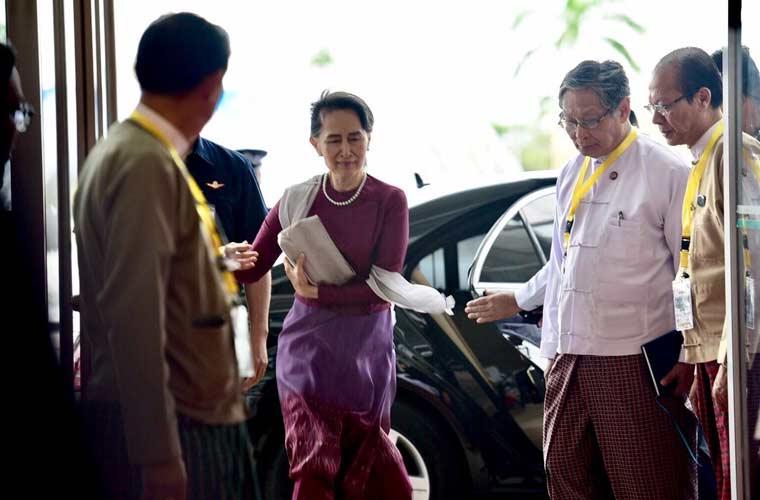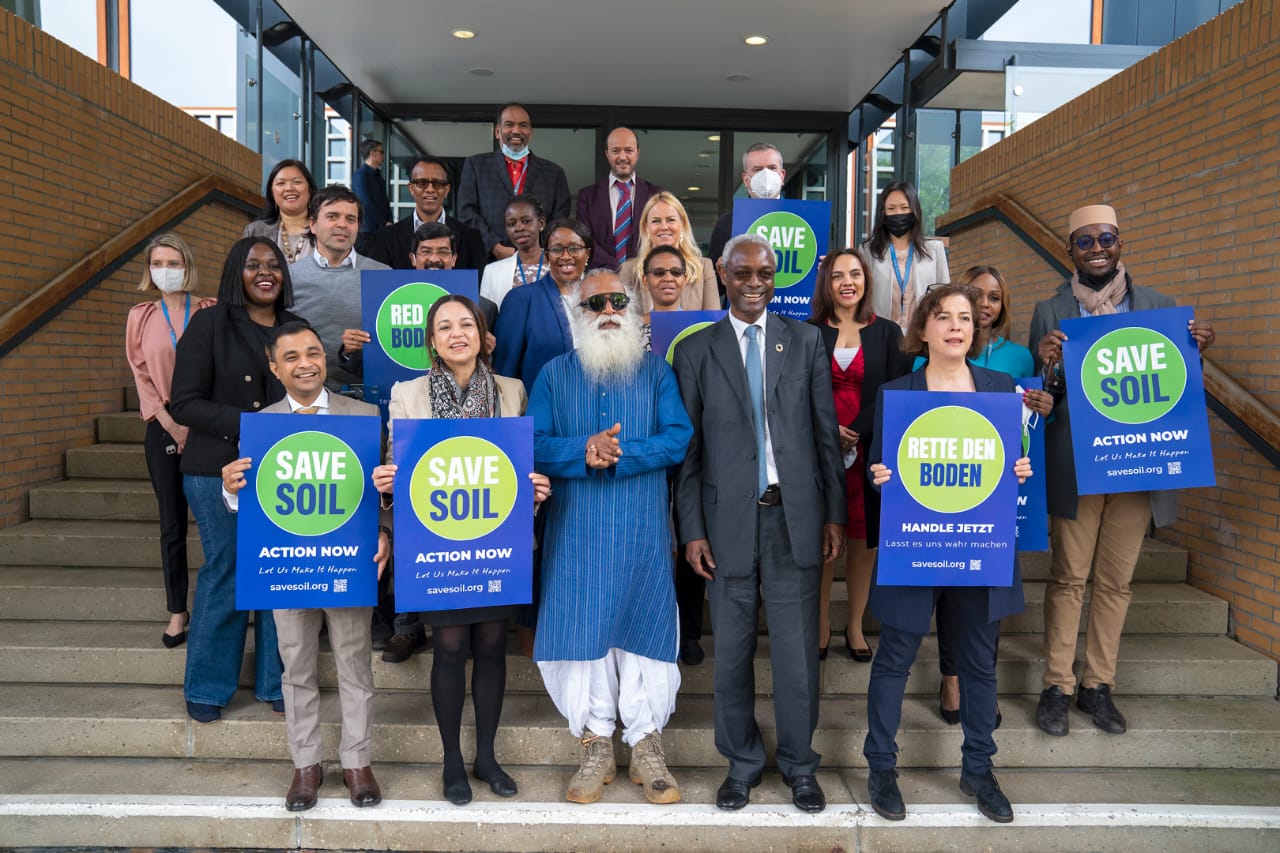Trending Now
- Alliance talks between AIADMK and BJP are ongoing. An announcement will be made at the right time – Union Home Minister Amit Shah.
- Vijay spoke about TVK vs. AIADMK only to motivate party workers – AIADMK General Secretary Edappadi K. Palaniswami.
- South Indian audiences are not interested in Hindi films, which is why they don’t succeed – Salman Khan.
- KL Rahul joins Delhi Capitals; the team will face Hyderabad tomorrow.
World News
Aung San Suu Kyi condemns ‘human rights violations, unlawful violence’ in Rakhine
![]() September 19, 2017
September 19, 2017
Myanmar’s de-facto leader and State Counsellor Aung San Suu Kyi on Tuesday (Sep 19) made her first public speech on the violence in Rakhine State since the government launched “clearance operations” last month.
The message – delivered in English and broadcast on television – was an attempt by the Nobel Peace Prize winner to address global concern over the plight of Rohingya Muslim minorities in the conflict-ridden state.
Myanmar was committed to a sustainable solution for all communities in Rakhine and is taking steps to promote peace and stability in the state, said Aung San Suu Kyi.
“We want peace rather than war,” she said. “Peace, stability and progress are things all our communities aspire to.”
She added: “We would like to end the suffering of our peoples as soon as possible. I accept that the real responsibility to solve the problems in Myanmar lies with everyone in this country.
“Hate and fear are the main scourges of our world. We don’t want Myanmar to be a nation divided by religious beliefs or ethnicity … we all have the right to our diverse identities.”
The speech came amid mounting criticisms against her silence on the government’s offensive against Rohingya militants, in which security forces have been accused of murder, mass rape, torture and arson attacks on the Muslim minority.
“We’ve never been soft on human rights,” she said to an audience of diplomats and key government officials at the International Convention Centre in the capital.
In the 25-minute speech, Aung San Suu Kyi also said she “feels deeply” for the suffering of “all people” caught up in conflict scorching through Rakhine.
“We are concerned to hear the number of Muslims fleeing areas to Bangladesh,” she added, condemning any “human rights violations” that may have exacerbated the crisis.
Aung San Suu Kyi: Myanmar govt is nurturing nation and its imperfect democracy, needs time to overcome challenges https://t.co/Xas0oi8dMw pic.twitter.com/4GP66UtxWQ
— Pichayada P. (@PichayadaCNA) September 19, 2017
“FINDING OUT THE REASON FOR THE EXODUS”
Aung San Suu Kyi also said her government is working with Bangladesh to improve border security following the exodus of about 410,000 Rohingya since Aug 25.
She said: “We want to find out the cause of the Rohingya exodus to Bangladesh, as many remain in Rakhine despite the ‘state of turmoil’.”
Aung San Suu Kyi called the address a “diplomatic briefing”, saying her speech was a “friendly appeal for help”.
“I ask the international community to help us find new ways that are more constructive and daring to resolve the problems we have,” she said.
Aung San Suu Kyi added that Myanmar stood ready “at any time” to verify the status of the 410,000 Rohingya Muslims who have fled violence in the last month to aid the return of those eligible for resettlement.
“We are prepared to start the verification process at any time,” she said referring to those who have fled, without guaranteeing a return for all of the refugees.
"We've never been soft on human rights": #ASSK insists Myanmar is committed to defending human rights of everyone https://t.co/Xas0oi8dMw pic.twitter.com/57NorTSjPk
— Pichayada P. (@PichayadaCNA) September 19, 2017
WHAT IS HAPPENING IN RAKHINE STATE?
Violence is escalating in Rakhine State after a group of insurgents from the Arakan Rohingya Salvation Army (ARSA) attacked 30 official posts and killed 12 people on Aug 25.
The militants claimed it was a defensive action to counter the government’s atrocities against Rohingya Muslims, who have suffered decades of oppression and deprivation of citizenship as well as basic rights.
The insurgent attacks have provoked Myanmar’s security forces to hit back. The retaliation, however, has shocked the world with its scope of destruction and brutality.
WHAT IS THE IMPACT ON ROHINGYAS?
Over the past three weeks, the United Nations estimated more than 400,000 Rohingya Muslims have fled the hostility in Rakhine to Bangladesh. About 60 per cent of the refugees are said to be children.
Amid a serious shortage of humanitarian supplies, thousands of them continue to arrive at refugee camps near Cox’s Bazar every day. Many have died during their journey across the border into Bangladesh.
Back in Myanmar, satellite images published by Amnesty International show at least 26 villages in Rakhine State had been burnt. The satellite also detected about 80 large-scale blazes across the northern stretch.
UN human rights chief Zeid Ra‘ad al-Hussein described the situation as “a textbook example of ethnic cleansing” and denounced the government’s counter-insurgency operation.
However, the Myanmar government claimed the houses were destroyed by the Rohingya militants, not security forces or Rakhine Buddhists as accused by various parties.
WHY THE CRITICISM FOR AUNG SAN SUU KYI?
During the weeks-long offensive, Aung San Suu Kyi remained tight-lipped about the plights of Rohingyas. Her silence has moved human rights activists, officials and fellow Nobel Laureates to make public calls for her step up and protect the Muslim minority.
In his open letter to Aung San Suu Kyi, Nobel Peace Laureate Archbishop Emeritus Desmond Tutu asked his “dearly beloved younger sister” to intervene in the Rohingya crisis and to speak out for justice, human rights and the unity of Myanmar people.
“Guide your people back towards the path of righteousness,” he wrote.
Malala Yousafzai also called on Myanmar’s State Counsellor to take action against the escalating violence in Rakhine State.
“Over the last several years, I have repeatedly condemned this tragic and shameful treatment,” she said in a statement.
“I am still waiting for my fellow Nobel Laureate Aung San Suu Kyi to do the same. The world is waiting and the Rohingya Muslims are waiting.”
























